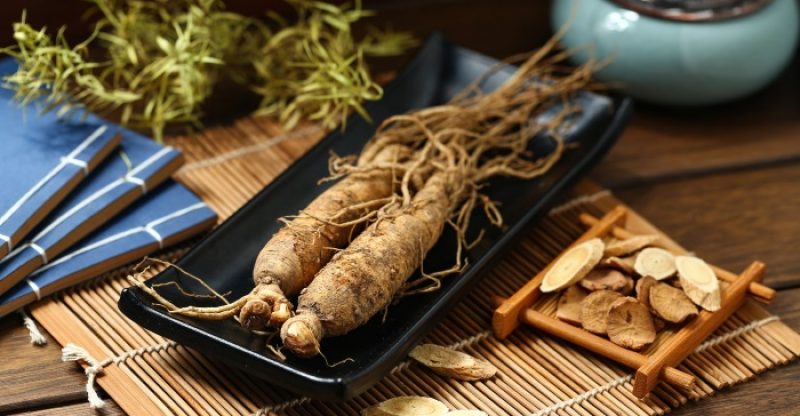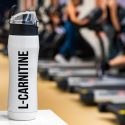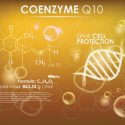12 Evidence-Based Benefits of Ginseng
The ginseng plant has been used around the world for centuries to treat illness and enhance performance.
Not only is ginseng good for your body, but it also improves your brain’s performance.
Whether you are looking for a natural treatment for anxiety, to stop feeling fatigued, or to boost your immune system, ginseng is an excellent option.
Our guide helps you understand all the benefits of this miraculous herb, and we will help you select the right type of ginseng for your problem.
Both Native Americans and the many Asian cultures have used ginseng for hundreds of years to treat all sorts of illnesses and maladies, so it is not surprising that we are still using ginseng today.
Science has proven the health advantages of ginseng, and few plant species provide so much benefit to humans.
To understand ginseng’s power, though, let’s first investigate what it is, and from where it comes.
Understanding Ginseng
All of the eleven ginseng species belong to the Panax genus, and its name in Greek means “all heal.”
The part of the plant used for medicinal purposes is the root, and there are both wild and cultivated species of the plants.
When people refer to ginseng, they could mean any of a number of species, including the American, Asian, or Korean varieties.
There are other plants that are called ginseng, like Siberian or Crown Prince ginseng, that are not actually members of the Panax genus; this makes them not true ginseng plants.
The Panax species of ginseng all share similar compounds, known as ginsenosides and gintonin.
These beneficial compounds are consistently under study for their potential medicinal uses, and different types of ginseng contain different amounts and types of these compounds.
While these roots have been used for centuries by many different cultures to treat medical disorders of all types, medical science has just begun recently to study the effects of these compounds (1).
Therefore, there is not as much empirical evidence to support all of the ginseng’s claims as some would like, and more data is needed to validate fully all the claims made regarding its powers.
Species of Ginseng
The true ginseng species comes from the Panax genus.
The three most common species of cultivated ginseng include Korean ginseng (Panax ginseng), American ginseng (Panax quinquefolius), South China ginseng (Panax notoginseng), and Vietnamese ginseng (Panax vietnamensis).
Wild ginseng is increasingly more difficult to locate and harvest (2).
Korean Ginseng
Also referred to as Asian ginseng or Chinese ginseng, this species has been used for thousands of years by many cultures in Asia.
This species is the original source for all other species of this plant.
Korean ginseng grows in the mountains of eastern Asia, including the Russian Far East, the Korean peninsula, and Manchuria.
All species of ginseng are slow-growing, and the roots are usually harvested after five or six years (3).
This species of ginseng has been used in traditional Chinese medicine to treat fatigue, exhaustion, memory problems, impotence, and even type 2 diabetes.
American Ginseng
This North American species grows in parts of the Northeastern US and Canada.
This species of ginseng has been used by native tribes to treat many different disorders and illnesses.
While this version is milder than the Asian varieties, American ginseng is quite effective for use in treating anxiety, improving attention, and enhancing immune system performance.
Other Adaptogenic Herbs
While these are not members of the Panax genus, and therefore not true ginseng species, these adaptogenic herbs have similar properties and are often used to treat similar disorders as ginseng species.
Among these relatives of ginseng are Siberian ginseng, Indian ginseng, and Brazilian ginseng.
Siberian ginseng, whose botanical name is Eleutherococcus senticocus, can be found growing wild in parts of Asia and Russia.
This herb contains compounds called eleutherosides, which have benefits similar to the ginsenosides that make ginseng so powerful.
Research indicates some promise for using Siberian ginseng to improve cardiovascular performance and immunity and reduce fatigue (4).
Another herb referred to as ginseng, but that is not a member of the Panax genus, is Brazilian ginseng, or Suma root.
This native of South America is used for its diverse health benefits, including boosting testosterone, reducing inflammation, and enhancing endurance (5).
Another adaptogenic herb known for its medicinal properties is Indian ginseng, which is more commonly referred to as ashwagandha.
Used in traditional Ayurvedic medicine, ashwagandha enhances longevity and provides many of the same benefits as Korean ginseng.
Ashwagandha is used to treat anxiety, regulate hormone levels, and lower cholesterol and blood glucose levels (6, 7).
This powerful herb has many uses for treating disorders and diseases.
The History of Ginseng
As early as 100 AD, ancient Chinese people were writing about the benefits and uses of ginseng.
As the popularity of this herb spread, tighter control was enacted on the fields and forests where ginseng was produced and harvested, and this herb became a commodity.
In modern history, the majority of ginseng has been supplied by Korea, while the Chinese are still the principal consumer of this herb.
North American ginseng is primarily produced in Wisconsin, British Columbia, and Ontario. Sales of ginseng currently exceed two billion dollars annually.
The age of the ginseng plant is considered important by many who use it for medicinal purposes, and wild ginseng that is very old is extremely valuable, selling for tens of thousands of dollars per ounce when it is discovered.
When ginseng plants are harvested when they are under four years old, this is referred to as fresh ginseng.
Plants between four and six years old that are dried after harvesting are called white ginseng.
Six-year-old plants that are steamed and dried after harvest are called red ginseng.
Most varieties of ginseng, including American ginseng, should be at least six years old before harvesting.
Wild ginseng is endangered, so the ginseng you purchase is most likely cultivated.
Health Benefits of Ginseng
Lowers Stress and Enhances Mood
In a study designed to test ginseng’s power to improve mental function and influence mood, researchers noted that 200 milligrams of ginseng given to participants over a period of eight days was able to promote calmness, as well as enhance performance in executing mental arithmetic.
This UK study included 30 participants who were given either ginseng or a placebo across three rounds of treatment (8).
Additional animal trials have indicated promise for ginseng to be used in the treatment of stress-related disorders.
For those with ulcers, chronic stress, and adrenal fatigue, 100 milligrams may be effective at relieving symptoms, improving adrenal function, and lowering stress levels (9).
More research is needed to determine the overall impact of long-term ginseng use on humans living with chronic stress.
Ginseng can also help relax your body and mind in ways similar to green tea and other natural remedies.
Those to regularly drink ginseng tea report more energy and personal satisfaction, as well as the ability to sleep better.
As a treatment for depression and anxiety, it has long been touted as effective at regulating levels of important “happy” hormones like dopamine, serotonin, and norepinephrine (10).
Boosts Sexual Performance
Powdered red ginseng, especially the Korean species, can promote improved sexual arousal, making it a promising treatment for erectile dysfunction.
While more empirical evidence is needed to support these claims, a review of previous research indicates there is suggestive evidence to support the claim that red ginseng can be used to treat this condition (11).
Of the 28 studies included in the review, all trials reported positive effects with red ginseng, and six reported significant improvement using red ginseng over a placebo to treat impotence.
It is believed that the ginsenosides in ginseng, by improving the vasodilation of the penis tissue, directly influence the ability to get an erection (12).
These chemical compounds trigger the release of nitric oxide, which relaxes the smooth muscles of the penis and allows it to become erect.
Ginseng may also have a direct effect on the release of hormones, which plays a role in sexual arousal and function, as well.
Many have used ginseng for centuries to treat both erectile dysfunction and other problems with impotence.
Lowers Inflammation
As a remedy for those undergoing chemotherapy to treat cancer, ginseng may be able to provide anti-inflammatory relief.
In a study in Korea involving young children with cancer, those who took 60 milligrams of ginseng daily had significantly lower levels of inflammatory cytokines in their blood than those taking a placebo (13).
Cytokines signal the immune system to release an inflammatory response to infection or trauma, and reducing the levels of this kind of substance can promote decreased inflammation in patients.
Animal trials also support this finding.
Rats given ginseng showed reduced levels of inflammatory cytokines, and damage done to the brain by inflammation was beginning to heal after just seven days.
Additional animal trials indicate that Korean red ginseng lowered inflammation in those with allergic rhinitis, making it a natural remedy for those with seasonal allergies, nasal congestion, and other upper respiratory symptoms (14).
While inflammation can be a helpful immune system response to infection or injury, chronic or prolonged inflammation can cause many health problems, and prevent proper healing of existing ones.
Improves Cognitive Function
Those with dementia, including Alzheimer’s disease, may benefit from ginseng.
It is believed that ginseng can stimulate neurons to improve cognition and memory.
Research on the effects of Panax ginseng on those with Alzheimer’s indicates that daily ginseng supplements can improve mental performance.
Patients in South Korea were given ginseng for up to three months, and cognition improved throughout that timeframe.
When patients discontinued use of ginseng, their improvement both stopped and declined to pre-trial levels (15).
For those caring for loved ones with dementia or Alzheimer’s, ginseng offers hope for improved memory and thinking.
Improves ADHD Symptoms
Because ginseng stimulates natural brain function, it could also be a natural remedy for calming the symptoms associated with ADHD.
Children with ADHD were studied to determine the effects of ginseng on attention, anxiety, social functioning, and other traits associated with the disease, and researchers found that 1,000 milligrams per day taken over a period of eight weeks was able to improve performance and reduce symptoms (16).
Boosts Weight Loss Efforts
Ginseng can serve as a natural appetite suppressant, help you burn fat more quickly, and boost your metabolism.
Ginseng can help control blood glucose levels, which can help regulate body weight and control hunger and cravings.
Animal trials have successfully shown that ginseng can help overweight and obese animals shed excess pounds and regulate metabolism, and additional research is needed to show how ginseng use in humans can have similar effects (17).
Because ginseng is a natural stimulant, it can have similar effects to those of caffeine and other natural stimulants that promote faster weight loss.
Lowers Blood Glucose Levels
American ginseng has been successfully proven to lower blood glucose levels in people with type 2 diabetes.
Ginseng could be considered a natural treatment for metabolic disorders such as diabetes, in some cases.
Research on diabetes shows that those who take ginseng are less likely to have spikes in blood sugar than those who do not.
Additional studies in the United Kingdom support these claims, showing a decrease in blood sugar levels one hour after consuming glucose in those who use ginseng (18).
It is hypothesized that ginseng actually increases the cells’ sensitivity to insulin, which means your body does not have to produce as much of it, and blood sugar levels remain more stable over time (19).
Those struggling to control their type 2 diabetes could greatly benefit from ginseng supplementation.
While treating diabetes with conventional medications is fine for some, those looking for a more natural approach to managing blood glucose levels can consider ginseng as a possible remedy.
Improves Cardiovascular Performance
By reducing lung bacteria, ginseng can help promote improved cardiovascular function.
While ginseng is known to help boost immunity, its ability to clear lungs of infection faster than a placebo holds promise for those with cystic fibrosis and other chronic lung disorders (20).
Those with inflammatory lung diseases can also enjoy the benefits of ginseng.
This herb is currently being studied as a possible treatment for the chronic obstructive pulmonary disease (COPD), with participants experiencing improved lung function and a decrease in some of the symptoms associated with COPD (21).
Relieves Symptoms of Menopause
For those troubled by the symptoms of menopause, ginseng could offer some relief.
Ginseng can reduce the severity of menopausal symptoms, including mood swings, irritability, anxiety, depression, night sweats, hot flashes, decreased sexual appetite, vaginal dryness, insomnia, and weight gain.
Ginseng can effectively boost female sexual arousal, as well as help promote overall well-being.
Ginseng’s power to reduce depression is perhaps its greatest benefit for those undergoing menopause (22).
Women in menopause may, therefore, consider ginseng as a possible treatment for their symptoms.
Helps Prevents Cancer
The antioxidants in ginseng are powerful enough to inhibit the growth of different types of tumors, making it a good addition to other treatments for those with cancer.
Ginseng lowers oxidative stress, promotes cell immunity, and boosts the production of natural cancer-killing cells, all of which can help in the battle against cancer (23).
Ginseng has been studied in those with colorectal cancer, and its abilities to reduce tumor growth and influence gene expression yield significant results (24).
Further research is needed to validate these claims, but ginseng’s ability to help fight cancer holds promise as a future treatment for those with this disease.
Boosts Immunity
Ginseng has been used to boost immunity for centuries.
This herb is widely touted for its ability to help the immune system ward off disease and infection.
All parts of the ginseng plant, including the leaves, stems, and roots, are helpful in enhancing the body’s natural processes for reducing infection.
Ginseng can help increase the production of cells that contribute to immunity, including T cells, B cells, dendritic cells, and macrophages, as well as other immune boosters.
The antimicrobial properties of ginseng also make it excellent for defending against a variety of sources of infection, especially bacterial and viral ones.
Ginseng lowers bacterial levels in organs, as well as reduces inflammation, making it a perfect addition to treatments for disorders such as rotavirus, influenza, and HIV (25).
Promotes Hair Growth
For those suffering from alopecia and other types of hair loss, ginseng could hold promise.
The natural compounds in ginseng promote hair growth and can be used by those with different types of hair loss.
Ginseng not only enhances the health of your scalp by reducing microbes that can damage hair follicles, but it also nourishes your follicles to promote healthy hair growth.
Ginseng contains saponin, which is a natural anti-bacterial agent, as well as phytosterols, which can halt or slow the premature graying of hair as you age.
Other nutrients in ginseng strengthen hair follicles, which can reduce the amount of hair lost each day.
Ginseng is also high in cellulose, which is known to help hair growth.
Cellulose protects the surface of your hair from damage and keeps follicles healthy, as well.
Research on the use of ginseng to treat hair loss has indicated that ginseng can create more opportunities for healthy hair growth by stimulating the dermal cells on the scalp.
Because Korean and American ginseng supplements have fewer side effects than traditional and pharmacological treatments for hair loss, they are often preferable for many people.
Many natural hair growth products contain ginseng, as well.
Because ginseng also has other benefits, such as reducing stress, which can promote hair growth, it may help solve your hair loss problem by treating the cause rather than just the symptom.
Ginseng FAQs
What is the Nutritional Information for Ginseng?
The active pharmacological compounds found in ginseng include ginsenosides, acidic polysaccharides, polyacetylenes, and polyphenolic compounds.
One ounce of ginseng root contains about 100 calories and two grams of fat.
This serving also contains 44 milligrams of sodium and 23 grams of total carbohydrates, including six grams of fiber.
Ginseng contains no discernible amounts of other vitamins or minerals.
How Do I Take or Use Ginseng?
There are a number of ways you can consume ginseng.
The actual root of the plant can be steamed to soften it before eating, but you can also just eat the root raw.
Making ginseng tea is a popular method, as well.
Or you can add dried or powdered ginseng to the foods you cook, including soups, stews, stir-fry, and other recipes.
Extract of ginseng root is available in many different forms, including oil and powder.
What Do I Need to Know when Purchasing Ginseng?
Products made from ginseng contain the root and root hairs of the plant.
Ginseng is available commercially in powdered, capsule, tablet, and dried forms.
Ginseng is often combined with other herbs, such as Ginkgo biloba, in various types of supplements.
Always read labels when you are purchasing ginseng products.
Panax ginseng (Korean or Asian ginseng) or Panax quinquefolius (American ginseng) should be clearly labeled, and be sure the manufacturer and distributor are both reliable and reputable companies.
Many ginseng products contain little or no actual ginseng, so you want to be sure you are buying products from those with a reputation for delivering purity and quality.
How Do I Make Ginseng Tea?
If you want to try adding ginseng to your daily diet, ginseng tea is an excellent method.
Chinese people have been enjoying ginseng tea for nearly five thousand years, and many herbal healers recommend adults drink a cup of ginseng tea every day.
Drinking this tea can help you improve your memory, and boost your cognitive capacity.
To make tea using ginseng, you can use ginseng tea bags purchased from a health food store, or you can use ginseng root, which will have the most beneficial effects for your health.
Fresh ginseng root is difficult to find outside of an Asian food market, so look for dried or powdered ginseng, instead. If using the root, peel a few shavings from the root.
If using powdered, place one tablespoon of this form in a filter or tea ball.
After boiling water, allow it to cool for at least three minutes before pouring it over your ginseng powder or root.
Allow your tea to steep for five minutes before enjoying.
If you are using the root shavings, you can even eat these after you drink your tea to enjoy more health benefits.
What are the Recommended Dosages for Ginseng?
The recommended dosages may vary depending on the potency of the root, the purity of the supplement, and other factors.
The following dosages have been studied using scientific methods for treating various disorders.
- To treat erectile dysfunction, take 900 milligrams three times per day.
- To lower stress and improve symptoms of fatigue, take up to 500 milligrams two times per day.
- For the treatment of type 2 diabetes, take 200 milligrams per day.
- For the improvement of memory and cognitive function, take up to 400 milligrams twice per day.
Precautions
Side Effects
If you experience any side effects from taking ginseng, they are likely to be very mild.
Some people experience a slight stimulant effect, which can result in insomnia or nervousness.
If you feel these side effects, try lowering your dose.
If you use ginseng for extended periods or in high doses, you can develop stomachaches, dizziness, and headaches.
Changes in your menstrual cycle or symptoms can occur in women who use ginseng regularly.
Very rarely, allergic reactions to ginseng have been reported (26).
Ginseng has not been studied in children or pregnant or lactating women, so it should not be used by these groups without first discussing it with a doctor.
To reduce the likelihood and severity of ginseng side effects, do not take ginseng for more than three to six months.
It is suggested you then take a break of at least two months before resuming regular use of ginseng.
Drug Interactions
If you have diabetes and take medication to control your blood sugar, you should talk with your doctor before taking ginseng, as this supplement may affect your blood glucose levels.
If you regularly drink caffeine, this can amplify the stimulant effects of ginseng.
Ginseng may increase the symptoms for those with autoimmune disorders.
If you have rheumatoid arthritis, lupus, multiple sclerosis, or any other autoimmune disease, you should talk with your doctor before taking ginseng, and while you are using it if your symptoms change.
Ginseng can interfere with your blood clotting function, so if you have a bleeding condition, such as hemophilia, you should not take ginseng.
If you have received an organ transplant, you should not use ginseng, as it raises your risk of rejecting your organ.
Ginseng does have some estrogen-like effects on the body, and can, therefore, intensify illnesses associated with female hormones, such as uterine cancer, ovarian cancer, breast cancer, endometriosis, and uterine fibroids.
If you take any of the following medications, ginseng may have an interaction that could impact your health.
Talk to your doctor about taking ginseng if you also take:
- Drugs to treat diabetes
- Antidepressants
- Antipsychotics
- Medications for blood thinning
- Morphine
- Stimulants
It is possible to take too much ginseng, and this can lead to Ginseng Abuse Syndrome.
Symptoms of this include hypertension, bleeding in the genital organs, the toxicity of the reproductive, cardiovascular, and renal systems, and gynecomastia (27).
Conclusion
Ginseng is a natural herb with many medicinal powers, which is why it has been used as a natural remedy for centuries.
The ancient Chinese and Native American people had many uses for ginseng, including to treat infections and to boost energy.
The two major species of ginseng most widely used are Korean or Asian ginseng and American ginseng.
While ginseng does grow in the wild, it is rare these days, and nearly all ginseng sold today is cultivated.
Ginseng is available in many forms, including as a raw root, a dried root, or in powder, capsule, oil, or tablet form.
Ginseng should be taken according to the recommendations outlined by your doctor or other medical professionals.
The natural health benefits of using ginseng are numerous.
It can help promote better cognitive function, boost your immune system, promote sexual arousal, and lower inflammation.
Ginseng is also known to help enhance mood, regulate hormones, help with anxiety and depression, reduce the symptoms of ADHD, and ward off cancer.
Ginseng is also able to help regulate blood sugar levels, boost your weight loss efforts, help you regrow hair, and breathe easier.
Ginseng can interact with certain drugs and may have side effects for those with certain medical conditions.
Talk with your doctor before using ginseng if you are taking medicine for diabetes, have a bleeding disorder, take medications for mental illness, or have an autoimmune disorder.
FDA Compliance
The information on this website has not been evaluated by the Food & Drug Administration or any other medical body. We do not aim to diagnose, treat, cure or prevent any illness or disease. Information is shared for educational purposes only. You must consult your doctor before acting on any content on this website, especially if you are pregnant, nursing, taking medication, or have a medical condition.
HOW WOULD YOU RATE THIS ARTICLE?






